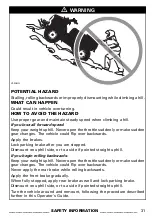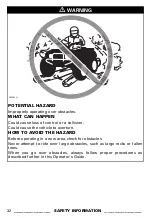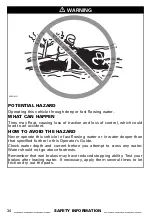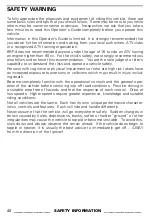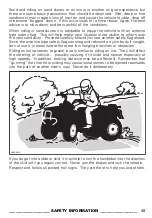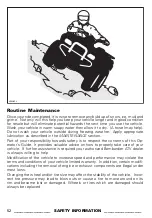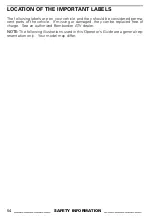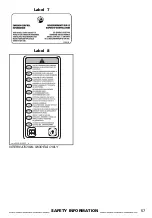
Always keep a safe distance from other riders. Your judgment of speed, ter-
rain conditions, weather, mechanical condition of your vehicle and the “trust in
judgment” you have in others around you will help you make a better choice of
appropriate safe distance. This vehicle, like any other motorized vehicle, cannot
stop “on a dime”.
Before you ride, tell someone where you are planning to travel and your expected
time of return. Never consume alcohol or drugs before or while riding!
Depending on the length of your ride, carry additional tools or emergency equip-
ment. Find out where you can get additional gasoline and oil. Be prepared for
the possible conditions you may encounter. An emergency first aid kit should
always be a consideration.
Environment
One of the benefits of this vehicle is that it can take you off the beaten path
away from most communities. However, you should always respect nature and
the rights of others to enjoy it. Do not ride in environmentally sensitive areas.
Do not drive over forest crops or shrubs... nor cut down trees or take down
fencing... nor spin your wheels and destroy the terrain. “Tread Lightly”.
Chasing wildlife is in many areas illegal. Wildlife can die of exhaustion after being
chased by a motorized vehicle. If you encounter animals on the trail, stop and
observe quietly and with caution. It will be one of the better memories of your
life.
Observe the rule... “what you take in, carry out”. Do not litter. Do not start
campfires unless you have permission to do so... and then only... away from
dry areas. The hazards you may create on the trail may cause injury to others or
yourself, even at a later date.
Respect farm lands. Always obtain the permission of the landowner before riding
on private land. Respect crops, farm animals and property lines. If you come to
a closed a gate, close it again after yourself.
Finally, do not pollute streams, lakes or rivers and do not modify the engine or
muffling system, or remove any of its components.
Design Limitation
Although the vehicle is exceptionally rugged for its class, it is still a light vehicle
by definition and its operation must be restricted to its proper purpose.
The addition of weight to any part of the vehicle changes its gravitational stability
and modifies its performance.
Off-Highway Operation
The very nature of off-highway operation is dangerous. Any terrain, which has
not been specially prepared to carry vehicles, presents an inherent danger where
angularity, terrain substance and exact steepness are unpredictable. The terrain
itself presents a continual element of danger, which must be knowingly accepted
by anyone venturing over it.
44
___________
SAFETY INFORMATION
___________
Summary of Contents for DS 250
Page 1: ......
Page 8: ...6 _______________________...
Page 11: ...SAFETY INFORMATION ____________ SAFETY INFORMATION ____________ 9...
Page 57: ...1 8 7 5 3 2 6 4 vmo2006 013 004_a ____________ SAFETY INFORMATION ___________ 55...
Page 60: ...58 ___________ SAFETY INFORMATION ___________...
Page 61: ...VEHICLE INFORMATION _____________________ 59...
Page 63: ...Engine Identification Number Location vmo2006 014 005_a TYPICAL _____________________ 61...
Page 68: ...12 8 9 16 6 7 1 5 11 14 17 3 4 6 7 4 2 5 15 13 10 vmo2006 013 005_a 66 ______________________...
Page 98: ...96 ______________________...
Page 99: ...MAINTENANCE INFORMATION _____________________ 97...
Page 127: ...WARRANTY _____________________ 125...
Page 133: ..._____________________ 131...
Page 135: ..._____________________ 133...
Page 136: ...134 _____________________...
Page 138: ......


